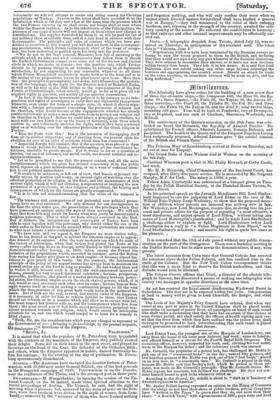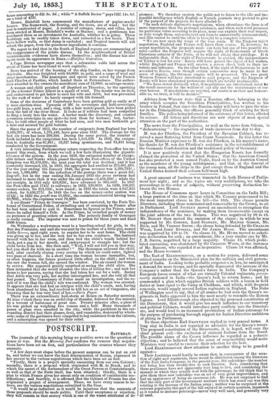atistrIloututts.
The Admiralty have given orders for the building of a now screw fleet of three line-of-battle ships,—the Conqueror 100, the Hero 90, the Re- pulse 90; three frigates,—the Forte 50, the Topaze 50, the Aurora 50;. three corvettes,—the Pearl 20, the Pylades 20, the Esk 20; and three- sloops,—the Fawn 16, the Falcon 16, and the Ariel 8; total twelve ships, mounting 630 guns. Four will be built at Pembroke, two at Dcvonport, two at Deptford, and one each at Chatham, Sheerness, Woolwich, and MilwalL
The anniversary of the Queen's accession, on the 20th June, was cele- brated on board the Britannia, the flag-ship of Admiral Dundas. He entertained the French officers Admirals Lasusse Romain-Defosses, and Jacquinot. The health of the Queen and of the Emperor Napoleon having been reciprocally proposed, Admiral Lasusse gave the cordial reunion of the British and French fleets."
The Princess Mary of Leuchtenberg arrived at Dover on Saturday, and. set out at once for Torquay.
The Grand Duke of Saxe Weimar died at Weimar on the morning of the 8th July.
Cardinal Wiseman paid a visit to Mr. Philip Howard, at Corby Castle, last week.
Mr. H. R. Reynolds, Chief Commissioner of the Insolvent Court, has resigned, after thirty-five years' service. He is succeeded by Mr. Sergeant Murphy, M.P. for Cork. The salary is 15001. a year.
Prince Adam Czartoryski was entertained at a banquet given on Tues- day by the Polish Historical Society, at the Thatched House Tavern, St. James's Street.
In his principal speech on the Juvenile Mendicants Bill, Lord Shaftes- bury happened to cite the judgment of Lord Eldon in the case of Mr. William Pole-Tylney-Long-Wellesley, to show that the proposed deten- tion of children whose parents are unmoral was nothing, new in law.. Mr. Wellesley, now Lord Mornington, resents this, as diving into his per- sonal and private affairs for the purpose of repeating "a most offensive, a most slanderous, and unjust speech of Lord Eldon,' without taking any notice of Lord Mornington's justification; and he sends Lord Shaftesbury a challenge either to explain or fight. Lord Shaftesbury refers Lord Mornington for a reply to "a Police Magistrate in Bow Street," or to Lord Shaftesbury's solicitors; and asserts his right to quote law-cases at his pleasure.
It is remarked that the 12th of July passed without any public demon- stration on the part of the Orangemen. There was a harmless meeting in the Dublin Rotunda ; but in other towns the demonstrations, if any, were private.
The latest accounts from Cuba state that General Cafiedo has arrested the notorious slave-dealer Julian Zulueta, and has confined him in the castle of the Cabana. But the New York Cuban correspondent thinks that this was a mere feint to deceive the British authorities, and that Zulueta would soon be liberated.
The Cologne Gazette affirms that Gintl, a director of the electric telb- graph in Saxony, has discovered a means of making one telegraphic wire convey two messages in opposite directions at the same time.
An act has received the Royal assent disafforesting Wychwood Forest in Oxfordshire. The deer are to be removed within two years. Compensation. in land or money will be given to Lord Churchill, the Ranger, and other officers.
The Lords of her Majesty's Privy Council have ordered, that when any i vessel at any port or place n the United Kingdom shall be placed under quarantine on account of yellow fever, all passengers on board of such vessel who shall make a declaration that they have had an attack of that disease at some former period, and shall satisfy the officers of health visiting such ves- sel that the fever from which they have suffered was the yellow fever, shall thereupon be permitted to land, notwithstanding that such vessel is placed under quarantine on account of that disease.
Lord Ethest Vane, the youngest son of the Marquis of Londonderry, ran atiray from the house of his tutor near Andover; last, week; came to London, and offered himself as a recruit for the Fourth Royal Irish Dragoons. The recruiting-officer, however, suspected his rank, and, eliciting his real name,, wrote to the Marquis his father ; and the refractory youth was rescued. Mr. Cotterill, the proprietor of a patent lock, has challenged Mr. Hobbs to' pick one of his "commercial locks" in one day ; rewind fifty guineas, and two hundred guineas if Mr. Hobbs can pick one of his " best locks," placed on an iron door, in "a reasonable time." Mr. Cotterill is piqued to do this, because Mr. Hobbs said that Saxley's lock, which he picked in three mi- nutes, was made on Mr. Cotterill's principle. This Mr. Cotterill denies. Mr. Hobbs repeats his assertion, but declines the challenge. • Ile does not con- skier himself bound to pick locks whenever called on. According to the Record, Dr. Achilli is about to "start as a luminary of Swedenborgianism in America." -Mr. Apsley Pellatt having expressed an opinion in the House of Commons that the clergy do not bear their share of public burdens, several clergymen. have "written to the Timm" to prove that they do, and more than their share. "A Kentish Vicar," with a gross income of 2681., pays state and local taxes amounting to 521. 9s. 5d.; while" A Suffolk Rector" pays 132/. 14s. 6d. on a total of 4751.
Messrs. Bielefeld have commenced the manufacture of papier-mache houses. The framework, the flooring, and the doors, are of wood ; but the rest is constructed of paper. A number of cottages, stores, and villas, have been erected at Messrs. Bielefeld's works at Staines ; and a gentleman has purchased them as an investment for Australia, whither he is going. These buildings can be readily taken down, and reerected in a few hours. They have hollow walls, so that damp is excluded, and Tropical insects will not attack the paper, from the poisonous ingredients it contains.
We regret to find that in the South of England reports are commencing of the reappearance of the potato disease. In the neighbourhood of Bristol unmistakeable evidences have shown themselves ; and the disease has also again made its appearance in Essex.—Halifax Guardian.
A Cape Breton newspaper says that a submarine cable laid across the strait of Canso has been found to work capitally.
News has arrived of the burning of the ship Condor, on her voyage from Australia. She was freighted with 80,0001. in gold, and a cargo of wool and other merchandise. The passengers and specie were saved by the French hark Charles et Pauline, which landed them at Pernambuco. The author- ities awarded to the owners the munificent sum of 12,000/. as salvage-money.
A woman and child perished off Deptford on Thursday, by the upsetting of the schooner Prince Albert in a squall of wind. The master was on deck, and endeavoured to get below to save his wife and child, but was prevented by the rush of water : he barely escaped with life himself.
Some of the denizens of Canterbury have been getting gold as easily as if it were election-time. Upwards of 50/. in sovereigns end half-sovereigns, two gold keys, a seal, and a ring, with a hair watch-guard, have been picked from the bed of the river Stour. It looks as if robbers had been compelled to fling a booty into the water. A barber made the discovery, and counted seventeen sovereigns in one spot—he took them for buttons; but, barber- like, he told other people of what he had seen, and two men forthwith got a boat and secured the gold buttons.
Since the peace of 1815, the number of emigrants from England has been 3,463,292; of whom, 1,791,446, have gone since 1847. The average for the last six years has been 298,584. During the same period, the number of Irish included in the emigration has been 1,313,226. In 1852, the emigra- tion to Australia was 87,881; 53,527 being spontaneous, and 34,354 being conducted by the Government.
A very interesting Parliamentary return respecting the Post-office has ap- peared this week, from which we cull a few facts illustrating the gigantic advance of the system. In the year 1839, the estimated number of charge- able letters and franks which passed through the Post-offices of the United Xingdom was 82,470,596; the next year the total was doubled ; and it has constantly increased, till, in 1852, the aggregate had swelled to 379,501,499. For the year ending 5th January 1840, the gross revenue was 2,390,763!.; the net, 1,589,4861. On the reduction of the postage there was a great fal- ling-off; but in the year ending 5th January 1853 the gross revenue had increased to more than it was under the old system-2,44,3261.; while the net receipts, in 1841 only 410,028/., have advanced to 965,442/. In 1837 the Post-office paid 1743/. to railways ; in 1852, 329,963/. In 1839, 188,921 money-orders, for 313,1241., were issued ; in 1852 the totals were 4,947,82.5 orders, for 9,438,2771. In 1848 the loss on the money-order system was 5745/.; in 1862 the profit was 11,6641., the commission received having been 8233L, 'while the expenses were 70,669/. A soi-disant "Prince de Gonzague " has been convicted, by the Paris Tri- bunal of Correctional Police, of swindling and of remaining in France after he had been ordered to quit it. Sometimes hi figured as the Prince, some- times he called himself a Pole. As the Prince, he swindled people of money on pretence of granting orders of merit. The princely family of Gonzague is really extinct. The impostor was sent to prison for three years and fined 3000 francs.
On Wednesday a workwoman went to a boarding-school for girls, in the Rue des Fontaines and said she was sent by the mother of a little girl, named Adele G—, aged eight years, to require her to be sent home. The child was given up to her, and she took her to her own residence. She fastened herself with her in her room, and then tied the child's hands behind her back, put a gag in her mouth, and endeavoured to strangle her; but the child broke from her. She then said, "Well, I will not kill you in that way, but you shall die with me in another ! " She thereupon unbound the child, and, after carefully closing every crevice by which air could enter, lighted two pans of charcoal. In a short time the woman became insensible, but, as often happens, the fumes produced little effect on the child ; and when she saw the woman fall, she opened the window. The air caused the woman to revive. She appeared greatly surprised at seeing the child alive. She then intimated that she would abandon the idea of killing her; and took her home to her parents, saying that she had taken her out for a walk. Seeing that Adele was very pale, her mother interrogated her, and she told all that had passed. The Commissary of Police made an investigation, and the re- sult of it was that the child's tale was confirmed. The woman was arrested. It appears that she had had an intrigue with the child's uncle, and, having been abandoned by him, had resolved to kill her as an act of vengeance, she knowing that he was very fond of her.—Paris Paper. There was an extraordinary hail-storm at Rouen on Saturday morning. At nine o'clock there was an awful clap of thunder, followed for five minutes by a torrent of hailstones of great size. Twenty minutes after, a piece of ice was picked up weighing two ounces and a half. Many thousands of panes of glass were smashed in the city, while the gardeners in the sur- rounding district had their glasses, fruit., and vegetables destroyed by whole- sale; some of the gardeners were compelled to beg assistance from the citizens, and a subscription was opened for their relief.



























 Previous page
Previous page